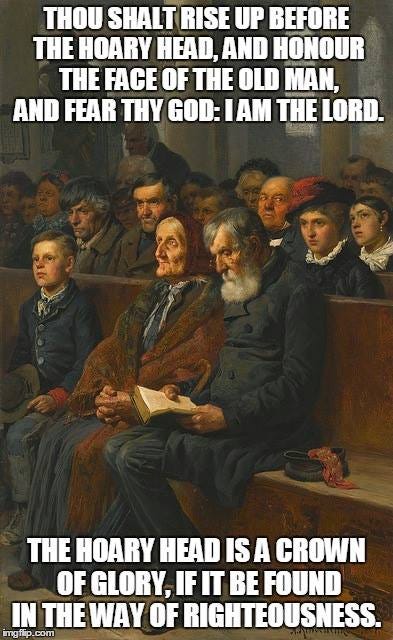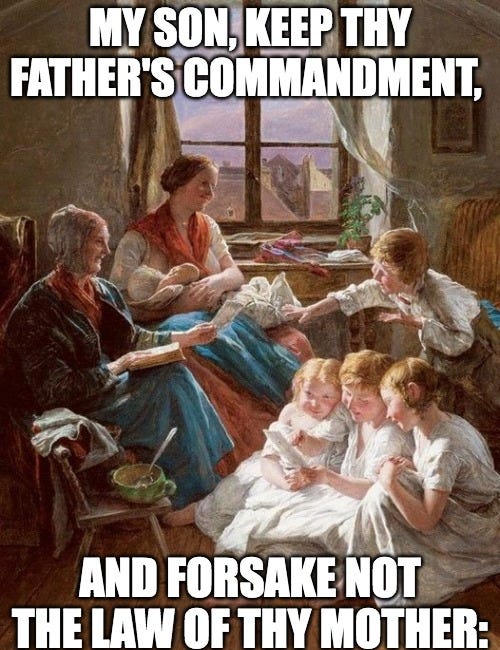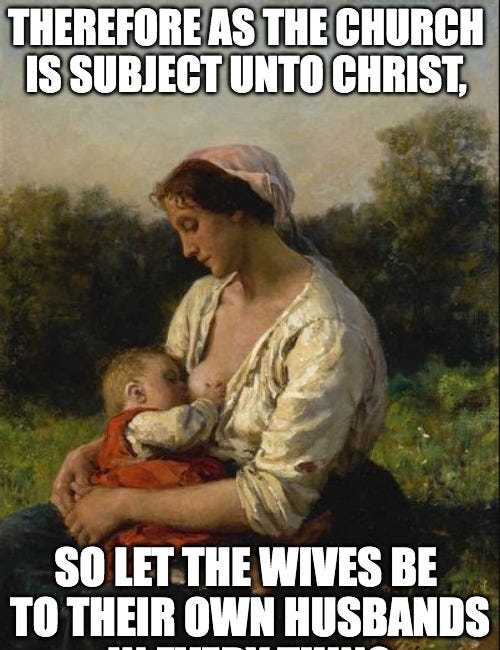And Jeremiah said unto the house of the Rechabites, Thus saith the LORD of hosts, the God of Israel; Because ye have obeyed the commandment of Jonadab your father, and kept all his precepts, and done according unto all that he hath commanded you:
Therefore thus saith the LORD of hosts, the God of Israel; Jonadab the son of Rechab shall not want a man to stand before me for ever.
Jeremiah 35:18-19
Introduction
So, I have this friend. He’s really super into theology, debates, and all. And he and I disagree on a lot of theological issues. The other day, he approached me on the issue of the Rechabites, on which I have posted a good deal and will continue to do so, and said he would like to have a debate.
And then, as they say, time went on, and I sent him gently monthly reminders that I had written several posts on the issue of Jeremiah 35 but that his contribution to the debate was, as yet, a bit light :)
And so, finally, he sent me his voluminous (9550 words by my count) response… but didn’t publish it anywhere! He said I could respond but that he didn’t have anywhere he wanted to put it just yet.
Which is a shame, but we persevere. So you can expect posts from me responding to one bit after another of his response.
Conclusion
There were many fascinating arguments in his unposted post. I think the most intriguing came in his conclusion. It was by far one of the most fascinating sentences I have ever read.
Here is the conclusion in total:
At long last, I finish my thoughts on Jeremiah 35. Jonadab’s commands were sinful, the Rechabites obedience to those sinful commands was laudable, but not required by God. God blessed the living Rechabite tribe because they drew the contrast He wanted to show His people. None of it is normative.
And here is the bit of that conclusion that I found fascinating. Indeed, it is worth a whole post about:
Jonadab’s commands were sinful, the Rechabites obedience to those sinful commands was laudable,
Now, I am having difficulty seeing that bit of that sentence as anything except one of the most extreme statements of hyper-patriarchy that I have ever seen. So I will ‘translate’ it below in various ways, and request that my readers jump in and see if I missed something.
Hyper-Hyper-Patriarchy
Jonadab’s commands were sinful, the Rechabites obedience to those sinful commands was laudable,
Now, the first way I will ‘translate’ this is to draw it out a bit and put it in a numbered list. As I see it, this bit of this sentence is saying a couple of things:
Jonadab, the son of Rechab, gave sinful commands to his descendants and
They obeyed them
God praised them for it.
If anyone sees anything different in that, I would welcome their translation. This is the first time I have heard anyone make this claim, so I am still analysing it. But what is more important is that I am trying to figure out how it fits into the rest of what my friend is trying to say. Why would God praise someone for obeying sinful commands?
As a hyper-patriarch, I have an answer. And it’s an answer that involves adding a couple of words to the sentence (see ‘Jurisdiction’ below). But I can’t figure out how it fits into his thesis for the life of me. Usually, when someone gets praised by God for something, the story reads like this:
Joe Blow did something good
God praised Joe Blow for doing something good
Occasionally, we see a story that reads something like this:
Joseph Blow did something that wasn’t good
But it was clever, tricky, etc
God praises Joseph for his intelligence, trickiness, etc.
But it seems counterintuitive to have a Bible story that reads:
Joey Blow did something that wasn’t good
God praises him for doing this thing that wasn’t good.
That seems to me to be the way an atheist would read the story. They don’t like what Joey did because it followed something God told Joey to do. Offer his son, for example. Or wipe out even the infants in Cannan.
So their story reads something like this:
God, as portrayed in the Scriptures, is evil.
The Blow family all did what this imaginary god wanted them to do
Which was evil
But that surely isn’t what my friend means! So, what does he mean?
Jurisdiction
Render therefore to all their dues: tribute to whom tribute is due; custom to whom custom; fear to whom fear; honour to whom honour.
Romans 13:7
First of all, let me get my own view in here before we go on to what others have said about this. I believe there are a variety of jurisdictions in this world, and God calls us to obey them… in their jurisdiction. In the area over which God has given them control.
Thus, Daniel could honour the king year after year and then blatantly and publicly disobey him in the area of who he would pray to. Sending the army to wipe out the Amoranians because they insulted his wife was within the jurisdiction of a king… but getting prayed to wasn’t. (If you take the broader meaning of ‘prayer’, meaning ‘to make a request’, then it wasn’t within the king's jurisdiction to become the sole person to whom requests could be made.)
Thus, the way that I read this story is that God believed that the commands that Jonadab, the son of Rechab, gave to his children were within the jurisdiction of a father/husband/patriarch to give. And thus obedience to them was good. Even if the commands themselves weren’t. (It's not something I claim or even address in either direction, but it's a point my friend tries to make in his unposted post.)
My view is a bit more nuanced than most of the old commentators. John Gill, for example, says:
…children should be subject and obedient in all things lawful, just, and good; in everything that is not sinful and unlawful, by the word of God; and in things indifferent, as much as in them lies, and even in things which are difficult to perform:
John Gill on Ephesians 6:1
I think the ‘not sinful’ way of putting it is awkward since it leaves the person obeying in the position of judging the commands they are being given. Which comes close to making them not commands. Saying ‘within their jurisdiction’ seems to fit the Scripture’s stories pretty neatly.
Godly Laws
My son, forget not my law; but let thine heart keep my commandments:
Proverbs 3:1
Now, one interesting thing that my friend points out is that he is not taking the cop-out route that many modern commentators, and even some old commentators, take. They say that Jonadab, the son of Rechab, was obeyed in his commands… because those commands were so Godly.
Thus, they translate my friend’s conclusion:
Jonadab’s commands were sinful, the Rechabites obedience to those sinful commands was laudable,
Into a much more palatable (for the modern Christian) version of:
Jonadab’s commands were just passing down what God Himself commanded, therefore the Rechabites obedience to what were actually God’s commands was laudable,
There is no evidence for this. As my friend points out, they go to great lengths to make this case, but there is no real case to be made.
Passed Down
For I know him, that he will command his children and his household after him, and they shall keep the way of the LORD, to do justice and judgment; that the LORD may bring upon Abraham that which he hath spoken of him.
Genesis 18:19
Now, something is missing in my friend’s conclusion. It is present in the story, at least in implication, but it is left out of his summary. He wrote:
Jonadab’s commands were sinful, the Rechabites obedience to those sinful commands was laudable,
But that isn’t the whole story, is it? Jonadab, the son of Rechab, had been dead for 300 years or so. (I wasn’t there to keep track). So when we say ‘commands’, what are we saying? He didn’t tell all these people directly. Did he set up some stone in the wilderness that all of the children of Jonadab happened to come to and see? Or is this the real issue:
Jonadab’s commands were sinful, the Rechabites passed these sinful commands down, generation after generation, commanding their wives and children to obey them, and ensuring that they did so. This form of obedience… obeying themselves, passing down, and ensuring that their family obeyed those sinful commands… was laudable,
That’s a little different, eh? That something that God would praise would be:
Being given sinful commands by your father
Obeying those sinful commands yourself
Passing down those sinful commands to future generations
Ensuring that your own living family obeyed those sinful commands
That seems like a bit of a different kettle of fish. Why would God praise that? The modern commentator would say that He wouldn’t. That process only works (and they’re not thrilled about it even then; see ‘silence’ below.) if you change the word ‘sinful’ to ‘Godly’. To passing on what God Himself has said. (And even then, the passage makes them rather queasy. See ‘silence’ below.)
Silence
But sanctify the Lord God in your hearts: and be ready always to give an answer to every man that asketh you a reason of the hope that is in you with meekness and fear:
I Peter 3:15
Now, let me be very blunt. The way that modern commentators and preachers tend to translate my friend’s conclusion is like this:
That’s it. Silence. You find very few modern preachers touch Jeremiah 35. And when they do, it is as I mentioned above: they say that these were Godly commands (the stricter forms of Baptists and Pentecostals have an easier time with this) and that that is why God praised the Rechabites for following them.
They combine this silence with silence on a dozen other passages and then conclude that God doesn’t teach patriarchy. They castrate and then note the absence of children.
Second Conclusion
Children, obey your parents in the Lord,.... The persons whose duty this is, "children", are such of every sex, male and female, and of every age, and of every state and condition; and though the true, legitimate, and immediate offspring of men may be chiefly respected, yet not exclusive of spurious children, and adopted ones, and of children-in-law; and the persons to whom obedience from them is due, are not only real and immediate parents, both father and mother, but such who are in the room of parents, as step-fathers, step-mothers, guardians, nurses, &c. and all who are in the ascending line, as grandfathers, grandmothers, &c. to these, children should be subject and obedient in all things lawful, just, and good; in everything that is not sinful and unlawful, by the word of God; and in things indifferent, as much as in them lies, and even in things which are difficult to perform: and this obedience should be hearty and sincere, and not merely verbal, and in show and appearance, nor mercenary; and should be joined with gratitude and thankfulness for past favours: and it should be "in the Lord"; which may be considered either as a limitation of the obedience, that it should be in things that are agreeable to the mind and will of the Lord; or as an argument to it, because it is the command of the Lord, and is wellpleasing in his sight, and makes for his glory, and therefore should be done for his sake:
for this is right; it appears to be right by the light of nature, by which the very Heathens have taught it; and it is equitable from reason that so it should be; and it is just by the law of God, which commands nothing but what is holy, just, and good.
-John Gill
So, let me repost my friend’s conclusion:
At long last, I finish my thoughts on Jeremiah 35. Jonadab’s commands were sinful, the Rechabites obedience to those sinful commands was laudable, but not required by God. God blessed the living Rechabite tribe because they drew the contrast He wanted to show His people. None of it is normative.
… and then put it in its fuller form:
Three hundred years (or so) before the prophet Jeremiah invited a family to the temple to (not) drink wine, a man, by the name of Jonadab, the son of Rechab, gave some wicked and sinful commands to his children. These children then passed these wicked and sinful commands down year after year, generation after generation, teaching them to their children. And teaching their children to obey those wicked and sinful commands. And enforcing obedience to those wicked and sinful commands upon their sons and wives and daughters living in their house. To the extent that, three hundred years later, they were still obeying those wicked and sinful commands. To the extent that the family refused the command of the prophet Jeremiah, given in the temple itself.
And God praised them.
But they said, We will drink no wine: for Jonadab the son of Rechab our father commanded us, saying, Ye shall drink no wine, neither ye, nor your sons for ever:
Neither shall ye build house, nor sow seed, nor plant vineyard, nor have any: but all your days ye shall dwell in tents; that ye may live many days in the land where ye be strangers.
Thus have we obeyed the voice of Jonadab the son of Rechab our father in all that he hath charged us, to drink no wine all our days, we, our wives, our sons, nor our daughters;
Nor to build houses for us to dwell in: neither have we vineyard, nor field, nor seed:
But we have dwelt in tents, and have obeyed, and done according to all that Jonadab our father commanded us.
Jeremiah 35:6-10
So what he is saying, and I confirmed this with him, is that it was sinful for Jonadab to give the commands, it was sinful for Jonadab to enforce the commands, it was sinful for his sons to pass down the commands generation after generation, and it was sinful for those sons to enforce the commands on those under their authority… but that God praises their obedience.
Now I, myself, do not hold such a hyper-hyper-patriarchal view. I hold that those commands were not wicked and sinful, were not calling on the sons to do wicked and sinful things: ie to pass those commands down and enforce them, but were within the proper jurisdiction of the father. And that while it was right and proper for them to obey and to teach and enforce obedience all down through those ages, it would not have been so if the commands given fell outside the lawful jurisdiction of the father.
Nor does the church historical share this hyper-hyper-patriarchal view. On the particular issue of the commands that Jonadab gave, the overall opinion is that they were not even neutral or merely difficult commands but that they were Godly commands meant for the benefit of future generations. And the church has consistently taught (up until recently) that the jurisdiction of the father, even over his grown sons (and not yet born ones, as here), is a vital one for the functioning of society and part and parcel of God’s blessing on a land.
But my conclusion for this post is that if you are going about to try to negate the authority of a father, yeah, a patriarch, over his adult sons… this is a funny way of going about it.
Links
1.Children, obey. Why does the apostle use the word obey instead of honor, (167) which has a greater extent of meaning? It is because Obedience is the evidence of that honor which children owe to their parents, and is therefore more earnestly enforced. It is likewise more difficult; for the human mind recoils from the idea of subjection, and with difficulty allows itself to be placed under the control of another. Experience shews how rare this virtue is; for do we find one among a thousand that is obedient to his parents? By a figure of speech, a part is here put for the whole, but it is the most important part, and is necessarily accompanied by all the others.
John Calvin on Ephesians 6:1
I usually put the section ‘links’ below the ‘end’ of my article. Below the part where I say, “Thank you for reading Von’s Substack”. However in this case I believe that these links are vital to understanding the authority and jurisdiction of the father.
Jonadab
Some posts very specifically about Jonadab, the son of Rechab
Jonadab, the Son of Rechab
Do you have any Biblical heroes? Do you have any fathers that you consider a Biblical hero? Do you have any fathers that you consider Biblical heroes that are largely unknown to the average Christian, and pretty much completely unknown to the average man on the street?
The words of jonadab
When God uses words… they are important. I believe that when we examine the Scriptures we need to pay a good deal of attention to the words that God, Himself, uses. We need to avoid putting words in His mouth, and taking words out of it.
The Context of Jonadab
And Jeremiah said unto the house of the Rechabites, Thus saith the LORD of hosts, the God of Israel;
Three Godly Fathers
Vance Gatlin has recently published a series, in honour of Father’s Day, on ‘Godly Fathers’. Or, as he put it ‘Good Bible Dads’. Along the way he and I had some conversations about who were good dads in the Bible, and he encouraged me to make my own list.
Related Issues
Other posts dealing with the meanings of the words obey, submit, command… and how these are worked out in Scripture.
Honour Thy Father: Adam to Abraham
Then came to Jesus scribes and Pharisees, which were of Jerusalem, saying,
Trust... and Obey
“Trust and obey, for there’s no other way…” sounds the old hymn. And you have to be a pretty unorthodox Christian to start talking about how one shouldn’t trust God. That’s full blown heathen territory.
Trust, Honour, and Obey
As anyone who has ever been overseas can readily tell you, the proper translation of words from language to language can be very important. That woman may not be embarrassed, she may be pregnant.
As Sarah Obeyed Abraham...
Even as Sara obeyed Abraham, calling him lord: whose daughters ye are, as long as ye do well, and are not afraid with any amazement.
Obey: Appendix
This post is meant to serve as a resource for all of the posts referencing honour, obedience, and submission in Scripture. It has been written specifically for my ‘Trust, Honour, and Obey’ post, but I am hoping it will be used for far more than that.
Submission in Silence
Submission is a hard thing. And not just because we are tempted to be disobedient, but because we are tempted to open our mouths and overwhelm those in our authority over us. Submission does not only require obedience… it requires silence!
Parthenogenic Parenting
In my day there was an expression popular amongst mothers, “Wait till your father gets home!” The modern reader, unfamiliar with the mothers of my day, might assume that the phrase indicated that mothers did not know how to use the woodshed. I can assure them that that is not true. For every one time that my father took his belt to my backside, my mothe…
Problems with Patterns of Patriarchy
I read a fascinating article by Lorenzo from Oz, which was cross-posted by Helen Dale. I think the article was well worth reading and a decent attack on a lot of progressive nonsense. It got me thinking about the subject, which prompted me to write a reply post. If the author ever sees my post, well and good, I will be happy to reply to him or anyone el…
Functional Obedience
Obedience has two steps. Actually a lot more than two steps. But assuming that we have already finished some of the steps, such as determining who is our authority and in what areas that they have authority… we are left with at least two steps in determining our obedience:
Judging the Patriarchs
Now consider how great this man was, unto whom even the patriarch Abraham gave the tenth of the spoils.
Thank you for reading Von’s Substack. I would love it if you commented! I love hearing from readers, especially critical comments. I would love to start more letter exchanges, so if there’s a subject you’re interested in, get writing and tag me!
Being ‘restacked’ and mentioned in ‘notes’ is very important for lesser-known stacks so… feel free! I’m semi-retired and write as a ministry (and for fun) so you don’t need to feel guilty you aren’t paying for anything, but if you enjoy my writing (even if you dramatically disagree with it), then restack, please! Or mention me in one of your own posts.
If I don’t write you back it is almost certain that I didn’t see it, so please feel free to comment and link to your post. Or if you just think I would be interested in your post!
If you get lost, check out my ‘Table of Contents’ which I try to keep up to date.
Von also writes as ‘Arthur Yeomans’. Under that name he writes children’s, YA, and adult fiction from a Christian perspective. His books are published by Wise Path Books and include:
The Bobtails meet the Preacher’s Kid
and
Soon to be coming out is GK Chesterton’s wonderful book, “What’s Wrong with the World”, for which ‘Arthur’ wrote most of the annotations.
Arthur also has a substack, and a website.
Thanks again, God Bless, Soli Deo gloria,
Von























